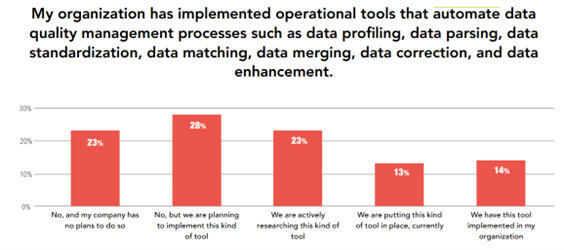Key Takeaways:
• Implement effective data quality management (DQM) to support the data accuracy, trustworthiness, and reliability you need for stronger analytics and decision-making.
• Embrace automation to streamline data quality processes like profiling and standardization.
• Develop standardized processes to quickly identify and fix data issues, maintaining integrity and compliance.
How confident are you in the quality of your data? Can you trust it for fast, confident decision-making when you need it most?
Across industries and business objectives, high-quality data is a must for innovation and data-driven decision-making that keeps you ahead of the competition.
The TDWI 2024 State of Data Quality Report by James Kobielus explores the current landscape of data quality management (DQM), highlighting its crucial role in enhancing business performance and decision-making processes.
Read on for an overview of the report’s key findings on the challenges, advancements, and best practices shaping data quality today, and get your copy of the report for full details.

What is Data Quality Management (DQM)?
At its core, data quality management (DQM) – also known as data stewardship – encompasses the procedures, policies, and processes used by enterprises to ensure that their data is accurate, reliable, and suitable for business use. High-quality data must be actionable, relevant, and trustworthy, serving as a dependable foundation for critical business operations and analytics.
And the importance of DQM today simply can’t be overstated. Think about it: if you’re like so many other organizations today, chances are you’re experiencing an increased reliance on diverse data types – from structured to unstructured and semi-structured – sourced from multiple platforms, both cloud-based and on-premises.
If that’s the case for you, you need effective DQM to:
- ensure compliance with standards and regulations
- facilitate accurate and timely decision-making
- support advanced analytical capabilities
Four Key Trends in Data Quality 2024
The report offers a comprehensive assessment based on a survey of data and analytics professionals across various industries and regions. It reveals several critical insights:
1. “Data quality success metrics are beginning to be put in place, albeit inconsistently.”
The majority of enterprises have established some form of data quality metrics, but only about 25% consistently measure and communicate these metrics.
The overall maturity of DQM practices is still emerging, with the average score across enterprises being 56 out of 100 on TDWI’s Data Quality Maturity Model – a stage three (“Established”) out of five (“Advanced/Visionary”) overall.

What do organizations at the “Established” level look like? At a glance, they:
-
- have strategies and plans in place for data quality, focusing on continuous improvement as they manage more diverse and larger datasets
- maintain clear accountability and communication about data standards across the organization
- have implemented preliminary data quality metrics to measure for accuracy, completeness, and timeliness
- use (or have started to research) tools like data catalogs and observability solutions, though these may not yet be automated
2. “Enterprises are more mature in managing the quality of structured data than newer data types.”
Organizations are adept at managing the quality of structured data, but management of unstructured and semi-structured data is less mature.
• 41% of respondents say their data quality strategy supports structured data only, even though they use all kinds of data
• Only 16% have a strategy encompassing all types of relevant data
3. “Enterprises have only begun to automate their data quality management processes.”
There’s a growing trend toward automating DQM processes like data profiling, matching, and standardization to enhance efficiency and effectiveness.
And yet, only 14% of organizations surveyed have started to automate these processes in full swing, with 13% saying they’re currently implementing these tools. 51% say they’re either planning to implement in the future or are in the research stage.
It’s important to note that end-to-end data observability of your complex data pipelines is a necessity if you’re planning to fully automate the monitoring, diagnosis, and remediation of data quality issues.

4. “Standardized processes for remediation of enterprise-wide data quality issues are beginning to gain traction.”
Many organizations still struggle with establishing standardized processes that help manage data issues.
41% of respondents lack clear processes for identifying and remediating data issues management processes, which poses significant challenges in maintaining data integrity.
Read the report
2024 State of Data Quality Report
The full 2024 State of Data Quality report has everything you need to know to get started – whether you’re just starting your DQM journey or looking to optimize your strategies. Get your copy today to be on your way to more strategic, informed, and successful data quality initiatives.
Best Practices for Enhancing Data Quality
To overcome the complexities of data quality management and leverage data as a strategic asset, the report recommends several best practices for DQM professionals. Here’s a preview of those recommendations to start building your action item list:
- Assess your DQM maturity. How well are your current practices provide accurate, timely, and actionable data for analytics and other use cases? Are they compliant with regulations around privacy and anti-bias?
Conduct a thorough audit to identify any rogue datasets, untagged data assets, and other issues in data lakes and self-service platforms so you can pinpoint areas for improvement in your DQM processes.
- Invest in training and culture. Promoting data literacy across your organization – for technical and business roles alike – is crucial.
You can achieve this with measures that drive more engaged and compliant data use, including the establishment of clear DQM policies, and training programs for DQM understanding and compliance. - Adopt process automation platforms. Implement advanced DQM tools and platforms that support automation of processes like data profiling and observability to significantly improve the effectiveness of data management practices across all of your diverse data types.
At the same time, you’ll boost the efficiency of your data stewards and other personnel currently involved in the manual execution of these tasks.
- Focus on continuous improvement. Organizations that are most successful view DQM as a moving target. You need to conduct regular assessments and make updates to strategies and tools accordingly. These investments will help you stay agile in the face of evolving business and tech trends without disruption to your business.
Enhance Your DQM Today for Better Business Outcomes
Looking ahead, the complexity and importance of strong data quality management are only going to grow. That’s why the time is now to take a closer look at your current practices, identify areas for improvement, and make the investments necessary to bridge those gaps.
The full 2024 State of Data Quality report has everything you need to know to get started – whether you’re just starting your DQM journey or looking to optimize your strategies. Get your copy today to be on your way to more strategic, informed, and successful data quality initiatives.







